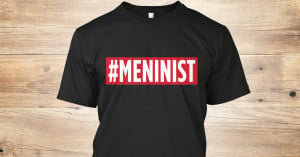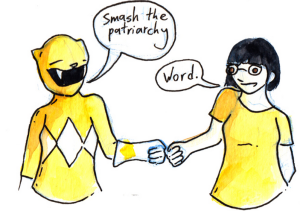
A person sits in front of a laptop, appearing worried, with one hand touching their forehead.
It can take courage to talk about how social injustice has affected you – and that makes it all the worse when you open up about it and people try to shut you down.
Most people who have spoken out about sexism, racism, or other societal problems will be familiar with at least one of several common arguments used to gaslight them.
Gaslighting is an abusive technique whereby people are made to believe that they don’t have a grip on reality. It’s often discussed in the context of intimate relationships, but it can be used by people in any sort of relationship.
Most of the time, it’s privileged people questioning marginalized people’s accounts of oppression. This serves to tell disadvantaged people that privileged people know what they’ve experienced better than they do – and that their perspective is not important.
That’s the crux of the problem, but let’s get more specific. Here are some arguments I hear people bring up to gaslight others about their own oppression – and why they’re so harmful.
1. ‘This Is a First-World Problem’
“How can you talk about microaggressions when girls in the Middle East are killed for trying to get an education?”
“Eating disorders are a first-world problem. Some people don’t even have food.”
This argument frequently comes up when people talk about issues faced by relatively privileged groups. It can have racist undertones, since the people with “real problems” are often from a different culture that the speaker doesn’t really understand.
It’s also dangerous because it implies that we should be grateful for being less oppressed than some people, rather than demand not to be oppressed at all.
As a woman, a person of color, or another member of an oppressed group, it’s easy to feel lucky when a man doesn’t rape you or a white person listens to you or anyone treats you like a human being.
But as Susan B. Antony said, “Our [j]ob is not to make young women grateful. It is to make them ungrateful so they keep going. Gratitude never radicalized anybody.”
Telling people they should be glad they don’t have it even worse fosters an unwarranted sense of gratefulness and teaches us to have low standards for how we’re treated.
Knowing that some people get third-degree burns doesn’t make first-degree burns hurt less. And bringing up more severe injuries is totally inappropriate when someone needs medical attention.
2. ‘We All Bleed the Same Color’
Feminism and other social justice movements are sometimes accused of being divisive, as if the divisions they’re calling attention to didn’t already exist.
This accusation often comes in the form of a plea to everyone’s common humanity: “We’re all people” and “we all bleed the same color” are phrases frequently used.
But here’s the thing: For a long time, people haven’t acknowledged that we’re all human and that commonalities between groups are stronger than the differences. And as a consequence, different groups of people have different experiences.
Once, a man told me he understood what it was like to self-objectify because he often worried about how professional he looked. When I tried to explain that I was talking about something entirely different, he claimed that we’re all humans, so we should be able to understand one another’s emotions.
“Pain is pain,” his friend agreed.
But there are many different kinds of pain. And if it seems to you like a distinct form of pain someone else describes does not actually exist, maybe that’s because you’re too privileged to have experienced it.
Look, I get it. I’m a huge hippie. I really do believe we’re all the same deep down inside. But we’ve been living under vastly different circumstances – and denying people the right to talk about the circumstances they’re subjected to conveys distrust for their perceptions.
3. ‘Don’t Let It Get to You’
One of my many Twitter trolls once told me that I should quit complaining about sex-shaming, fat-shaming, and other forms of shaming and just quit letting people make me feel ashamed.
But here’s the thing: I don’t generally let people make me feel ashamed. And that doesn’t stop the fact that they’re shaming people.
The idea of “letting” someone make you feel a certain way is problematic in of itself because it holds people responsible for others’ wrongdoings and characterizes emotional reactions as right or wrong.
But even if we were all robots who could decide not to mind when others mistreated us, that wouldn’t change the fact that they were mistreating us. It would just make us really good at handling mistreatment.
In fact, many of us have gotten really good at handling mistreatment, and that takes a lot of emotional energy.
We shouldn’t have to bear the burden of dealing with oppression or “not letting” other people’s behavior hurt us. We shouldn’t need to desensitize ourselves to inequality – because there shouldn’t be inequality in the first place.
Tuning out discrimination may seem like a good short-term solution, but in the end, it has costs on the individual and societal levels.
4. ‘Don’t Be the PC Police’
There have been a lot of debates lately, particularly on college campuses, over the line between deeming certain behaviors unacceptable and limiting free speech. People accused of the latter are often deemed the “PC (political correctness) police.”
When people complain about the PC police, they make it sound like we’re calling out people’s language and behavior the way one might call out improper grammar: as an intellectual hobby, and a pretentious one at that. Never mind the fact that people are deeply and personally affected by political incorrectness.
Political correctness is really just being a good person. By making it sound like some formal code of conduct, people demonize basic efforts to make others feel comfortable and included.
To members of a privileged group, expectations like using gender-inclusive language and avoiding ableist expressions can feel like arbitrary rules. But for the people personally affected by political incorrectness, this behavior makes a huge difference.
Even if we don’t fully understand how certain ways of speaking or acting affect groups we don’t belong to, it takes very little out of us when we accommodate them, while it takes a lot out of them when we don’t.
Political correctness isn’t hurting anyone. Political incorrectness is. No brainer. Next.
5. ‘There’s No Use Complaining’
Like “don’t let it get to you,” the advice that there’s no use complaining is often intended to be inspiring. Attitude is everything, the argument goes, so by being positive, you attract more positivity into your life.
But sometimes, we’re not trying to attract positivity into our lives. Social injustice isn’t about individual lives. And we won’t get rid of it by doing yoga or taking baths or doing whatever people suggest with this advice.
Being positive doesn’t help when there are issues that need addressing.
Yes, self-care is important for people doing social justice work, and sometimes, that does mean thinking positive thoughts.
But that’s a personal choice, and it’s for individual wellbeing. It doesn’t solve larger issues.
Acting like you can think away a societal problem totally trivializes it. If we could manifest a just society by harnessing the law of attraction, we would’ve done it already.
6. ‘They Mean Well’
If someone unintentionally says or does something oppressive, they’re not exempt from blame because they “mean well.” We’re allowed to call them out, no matter how unintentional the impact of their choice was.
In fact, it’s the people who mean well who will want our feedback, right? They’re the ones interested in learning how not to hurt people.
It’s nice of someone to try to be inclusive, but if their best efforts are unsuccessful, it benefits everyone to know that.
Good intentions don’t change the way a sexual assault survivor feels when someone tells a rape joke. Good intentions don’t get rid of the sting a queer person might feel when someone says “gay” as an insult.
We’re allowed to feel what we feel, and we shouldn’t have to hide or mute our feelings just to reward someone for meaning well.
***
On that note, people who say these things don’t always intend to gaslight. They’re often just operating off a false idea of what the other person wants.
They may, for example, think someone wants reassurance that things aren’t that bad, when what they actually want is validation that things really are that bad. They might think someone wants inspiration to get up every day despite the oppression they face, when really, what they want is larger societal awareness and action.
But since, again, it’s behavior, not intentions, that affects people, gaslighting is gaslighting even when it’s not meant to manipulate anyone.
The result of this repeated questioning and doubting is that people start feeling like their observations of their oppression are wrong, they don’t have the right to talk about it, and it’s not real.
When people learn their oppression isn’t real, they learn not to question it. And when they learn they can’t talk about it, they stay silent.
Even if it feels like you’re just playing the devil’s advocate, providing food for thought, or helping people understand the other side, what seems like friendly debate to you can be deeply hurtful to someone else.
So, instead of invalidating someone’s experiences, thank them for teaching you. That can take a lot of mental and emotional energy.
And let them know you believe them. That’s something people who talk about their oppression unfortunately don’t hear enough.
[do_widget id=’text-101′]
Suzannah Weiss is a Contributing Writer for Everyday Feminism and a New York-based writer whose work has appeared in The Washington Post, Salon, Seventeen, Buzzfeed, The Huffington Post, Bustle, and more. She holds degrees in Gender and Sexuality Studies, Modern Culture and Media, and Cognitive Neuroscience from Brown University. You can follow her on Twitter @suzannahweiss.
Search our 3000+ articles!
Read our articles about:
Our online racial justice training
Used by hundreds of universities, non-profits, and businesses.
Click to learn more




















